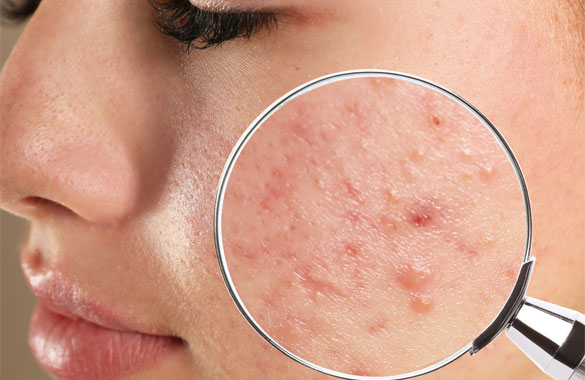

Looking for the best acne treatment in Delhi, Under the expertise of Dr. Shirin Bakshi’s DermaSure Skin and Hair Clinic makes acne treatment straightforward with certified dermatological assistance. We specialise in treating all types of acne. Our clinically approved methods perform diagnostics to ascertain the cause of acne, whether it is hormonal imbalance or other underlying causes. Then, we proceed to treatment, wherein we suggest specific methods or precautions to steer clear of acne.

Acne is a common skin condition that starts at puberty and affects many adolescents and adults. It appears on the face, shoulders, back, legs, etc., and requires appropriate medical treatment. Biological and environmental factors lead to acne, which tops up when hair follicles become clogged with dead skin cells.
Acne is a common skin condition that can cause several symptoms, including:
Hormones: Hormonal changes during puberty, pregnancy, menstrual cycles, etc. can cause acne.
Medications: A few prescriptions, like corticosteroids, lithium, and barbiturates, can cause skin inflammation.
Genetics: Acne tends to run in families.
Diet: Diet may play a role in acne.
Skin products: Oily or sleek beauty care products and hair items can trigger acne.
Sweating and humidity: Heavy sweating and humidity can cause acne.
Touching your skin: Excessively touching, or rubbing your skin can trigger acne.
Pressure: Pressure from sports caps, tight garments, or rucksacks can cause skin inflammation.
Contacting your skin: Unreasonably contacting, laying on, or scouring your skin can make acne worse.
Washing your skin: Washing your skin too often can make acne worse.
Treatment of acne varies from patient to patient. We carefully assess factors like types of acne, areas of your body affected by acne, previous acne treatments, your age, and residual problems of acne like dark spots or scars before proceeding with our treatment.
Our acne treatments in Delhi include:
Antibiotics aid in the reduction of acne inflammation and redness. At the moment, we recommended antibiotics for acne therapy: doxycycline, minocycline, and sarecycline.
Retinoids such as adapalene, isotretinoin, and tretinoin (retinoic acid) aid in the unclogging of pores by stimulating the development of new skin cells.
Benzoyl peroxide is an FDA-approved prescription drug for the treatment of acne vulgaris. It cures acne by lowering the quantity of acne-causing bacteria in the skin and causing it to dry and peel.
Hormonal therapy for acne outbreaks and scarring, such as combination oral contraceptive pills and spironolactone, is an effective acne treatment.
Cortisone injections are most effective for inflammatory acne, such as cystic pimples, swollen papules, and painful nodules.
Chemical peels like salicylic, retinoic, or glycolic acid remove hyperpigmentation and rough texture, giving the skin a clean and clear appearance. We provide the best chemical peel for acne scars to make your acne go away and let your skin glow!
Dermapen 4 is a ground-breaking microneedling device that not only eradicates the problem of acne, but also stimulates collagen formation, which tightens and rejuvenates the skin. It is one of the most reliable therapies available for treating both acne and acne scars.
When it comes to acne, the sooner you think about treatment, the better. Acne can affect your skin for the long term and can become excruciatingly painful or, more awful, leave apparent spots on the skin. For guaranteed results visit your one-stop destination Dermasure, the best acne treatment clinic in Delhi.
These benefits add to successful administration and treatment of skin breakouts, assisting people with accomplishing clearer skin and further developed certainty. Experience effective, minimally invasive acne treatment in Delhi at Dermasure Clinic and achieve clearer, healthier skin today.
Contrary to the popular belief that contact may spread acne, acne cannot be transmitted by skin-to-skin contact. Acne is not an infectious skin condition. Acne-causing bacteria flourish in low-oxygen settings (such as inside a clogged pore). When they come into contact with oxygen-rich conditions on the surface of your skin, they become mostly harmless.
Allow at least four weeks for an acne treatment to work.
If a treatment works for you, you should start seeing results in 4 to 6 weeks. Clearing might take two to three months or longer. Continue taking the remedy if you detect an improvement. Even if you notice some improvement, you should continue to use the acne treatment.
Acne and acne scars are more common in those with oily skin and can appear anywhere on the body where there are microscopic hair follicles and skin pores (excluding the palms of the hands and soles of the feet). Acne most commonly appears on the face and upper body regions such as the back, chest, and shoulders. The pores in these places are numerous, and excessive oil production makes the skin greasy and contributes to acne formation.
Most effective treatment for acne depends on the severity of the case and the origin of the acne. Here are some of the most effective ways adopted by dermatologists to cure acne:
If you suffer from acne, you don’t have to necessarily stop wearing makeup. If you suspect some of your cosmetic products might be causing problems then you may want to switch it.
Acne is a common symptom in people who tend to over wash their faces. Sometimes, washing your face more than two times a day and scrubbing your face can cause your skin to break out and become more prone to acne and pimples.
Yes, acne can affect all age groups and all skin types. Acne is usually found in teenagers due to frequent hormonal fluctuations but adult acne can be triggered due to menstruation in females, pregnancy and sometimes birth control or contraceptives.
Leave Them To #1 Skin & Hair Specialist In Delhi